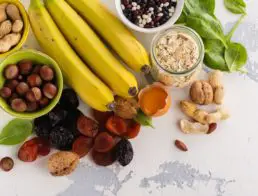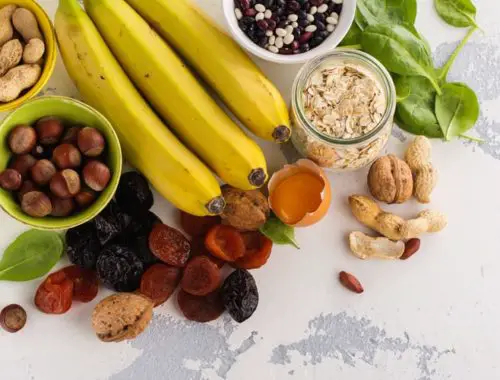Over 2,000 years ago, Hippocrates – the Father of modern medicine – keenly observed that “all disease begins in the gut.” Thousands of years later we are continuing to uncover the wisdom behind these words as seemingly endless connections between healthy digestion and overall health and disease prevention and treatment are linked.
The truth is that if something is wrong with your digestion and gut health, you are very likely to suffer many consequences, some of which play out in ways you would never think are rooted in the gut. While digestive issues and an unhealthy gut can take many forms, slow digestion due to a major lack of fiber and nutrients in a SAD (Standard American Diet) is a common complaint.
Signs of Slow Digestion
First of all, it’s important to understand the signs and symptoms of slow or sluggish digestion. Constipation is the most common and glaring sign that you need to speed up your digestion, and that something is not working as it should be. Daily bowel movements are foundational for health, as they allow the body to eliminate toxins instead of getting reabsorbed into the body. For this reason, constipation has actually been linked to multiple diseases, including cancer.
Other signs that your digestion might be sluggish include frequent heartburn or GERD, feeling bloated or uncomfortably full after eating, poor blood sugar control and weight gain.
Why Your Digestion is Sluggish
There are some very obvious reasons that so many people suffer from slow digestion these days, and many of these reasons are fairly easy to remedy.
One, the SAD diet is sorely lacking in fiber from vegetables and fruits, and instead is high in processed, sugary foods. This combination is a recipe for a damaged gut microbiome (which you can think of as the gut’s unique ecosystem) and over problems like yeast overgrowth. Second, overuse of antibiotics and gut-damaging medications like acid blockers and NSAIDs, like Advil, can wreak havoc on the gut if taken regularly over time.
Other causes might be an undiagnosed food allergy or sensitivity, an infection (more on this in a moment), toxins in your food or environment and chronic stress.
13 Ways to Speed Up Your Digestion
Here are twelve ways to speed up sluggish digestion and get your health back on track.
Take Probiotics
While fermented foods are great for daily maintenance of healthy gut flora, taking a probiotic supplement, such as Organixx ProBiotixx+, is often also helpful. Especially if you have a history of antibiotic use and/or a poor diet, chances are that your gut bacteria is in need of a boost. Taking a high quality probiotic supplement will help to reinoculate your gut with the good bacteria it needs, and research shows it can also help to boost your immune system and prevent certain diseases. Some probiotic recommendations include
Eat Slowly and Chew Thoroughly
This might seem like a no-brainer, but it is a simple habit that many of us do not practice. However, chewing your food until it is mush in your mouth before swallowing can have a dramatic impact on your gut health, particularly if symptoms such as bloating, gas, or other digestive upset is present upon eating.
Use Apple Cider Vinegar
Contrary to popular belief, those who suffer from acid reflux usually have low stomach acid levels, rather than too much. Stomach acid (hydrochloric acid/HCL) is important for general digestion (and especially protein digestion), and can be boosted by drinking 1-2 tablespoons of raw apple cider vinegar (ACV) in warm water about 15-20 minutes before a meal. If you don’t have access to ACV, try doing the same with fresh squeezed lemon water.
Include a Bitters Tincture
Bitter foods or a tincture of bitters works similarly to ACV, and both could be helpful to speed up digestion by promoting stomach acid and enzyme production. Better Bitters makes a great product, and can be taken 10 minutes before meals.
Take Magnesium
Magnesium is an important enzyme cofactor for over 200 chemical reactions that occur in the body and it is the main mineral that helps your muscles to relax, including the muscles of your GI tract. Over recent years largely due to large-scale industrial agriculture practices, the soil has become depleted in magnesium. Sadly, this has meant that a mineral once easy to get from the diet has become a real challenge.
Magnesium citrate is especially helpful for constipation and sluggish digestion, and as always it’s important to check in with your healthcare provider before starting any new supplement. This is the brand I swear by.
Exercise
Not only does exercise help to get things moving, but studies actually show that exercise contributes to a healthier balance of gut bacteria, which is important for optimal health and disease prevention. The CDC recommends either 150 minutes of moderate exercise per week, or 75 minutes of vigorous activity.
Get Plenty of Fiber
A high fiber diet plays an integral role in healthy digestion and metabolic health. Include at least five servings per day of vegetables along with seasonal fruits, nuts, seeds, beans and whole grains.
Stay Well Hydrated
Research shows that dehydration is one of the leading causes of constipation, and is essential for speeding up digestion. Staying well hydrated serves an endless list of functions in the body, as every cell, organ and tissue depends on water to work properly. Shoot for a minimum of half of your body weight in ounces of water per day.
I like to carry around this temperature regulating, stainless steel water bottle to ensure I’m always drinking water.
Avoid Processed Foods and Eat Real Foods
For speeding up digestion and supporting overall gut health, simply cutting out foods that are generally inflammatory can be extremely beneficial. Research shows that common inflammatory foods include refined sugar, refined grains, corn and soy.
On the flip side, fermented foods such as raw sauerkraut or kimchi, kombucha tea or kefir are excellent for providing the gut with good bacteria (aka, probiotics), which are important for speeding up slow digestion. Other healing foods are wild, fatty fish, nutrient dense steamed vegetables and a homemade vegetable or bone broth, like this great Bone Broth Protein from Organixx.
Uncover Underlying Problems
Once you’ve tried all of the above-mentioned strategies to no avail, you might need to work with a professional to dig deeper and uncover potential underlying problems, like a gut infection.
For example, one common bacterial infection is helicobacter pylori. Another cause could be a viral infection, which is often easier to pinpoint as it is acute. Parasitic infections are also more common than you might think, and can be contracted both traveling abroad and right here at home. A GI infection could also be a fungal infection, such as candida. Thankfully there are excellent functional labs available and practitioners to help you navigate treatment, whether that be herbs, nutritional supplements, medications or foods.
Pay Attention to Not-So-Obvious Symptoms
When we think of sluggish digestion, we easily connect it with digestive upset such as bloating, gas, pain, diarrhea and/or constipation, heartburn, and other types of symptoms of that nature. While these symptoms can definitely signify slow digestion or another GI problem, other symptoms that can also point to a GI issue are mood changes, fatigue, hormonal imbalances, weight gain, anxiety and more.
If these sorts of symptoms are ongoing and you don’t know why, work with a practitioner to take a closer look at your digestive health.
Manage Stress
Both stress and digestion are hugely important for not only speeding up digestion but also for immune, cognitive and metabolic health. Sounds easy enough, but this definitely can be the hardest factor to change. However, chronic stress can essentially halt digestion and lead to a long list of problems. In order to properly digest, our nervous system must be in its parasympathetic state, which is known as the “rest and digest” mode. If we eat while stressed or on-the-go, we are in our sympathetic state, and cannot effectively digest our food.
Limit NSAID Use
Studies show that non-steroidal anti-inflammatory drugs (NSAIDs), are particularly hard on the gut lining, and chronic use can lead to long-term damage. The most common brands are Advil, Motrin, Aleve, Bayer, Aspirin and Ibuprofen. Use these medications only when absolutely necessary to speed up and support good digestive health.
Digestion and a healthy gut are the base of human health, so make sure you do everything possible to speed up slow digestion and achieve glowing health from the inside out.









